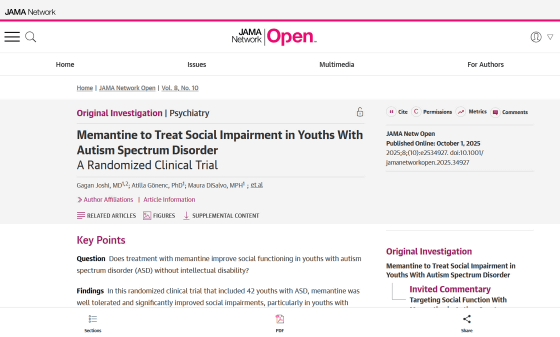Clinical trial shows Alzheimer's drug may improve social skills in children with autism

Memantine to Treat Social Impairment in Youths With Autism Spectrum Disorder: A Randomized Clinical Trial | Adolescent Medicine | JAMA Network Open | JAMA Network
https://jamanetwork.com/journals/jamanetworkopen/fullarticle/2839518

Alzheimer's Drug Shows Surprising Benefits For Some Kids With Autism : ScienceAlert
https://www.sciencealert.com/alzheimers-drug-shows-surprising-benefits-for-some-kids-with-autism
Memantine is a drug that blocks glutamate receptors in the brain and is approved in Europe, the United States, Japan, and other countries as a treatment for moderate to severe Alzheimer's disease.
Excessive levels of the neurotransmitter glutamate can be toxic, and reducing glutamate levels in the brain can slow the progression of neurodegenerative diseases.
A brain region particularly rich in glutamate receptors is the anterior cingulate cortex , which is involved in social processing and emotional recognition. Some evidence suggests that glutamate may be imbalanced in the anterior cingulate cortex in individuals with ASD, which may explain behaviors and symptoms related to communication and social interaction.

The new clinical trial involved 33 children with ASD, aged 8 to 17, who did not have intellectual disabilities, and was administered the drug for 12 weeks. The children were divided into two groups: the experimental group received 20 mg of memantine daily, and the control group received a placebo .
The results of the study showed that children in the experimental group who received memantine showed significant improvement in their symptoms compared to children in the control group who received a placebo. The children who responded best to memantine were those who had abnormally high levels of glutamate in the anterior cingulate cortex.
Adult caregivers interviewed by the research team reported significantly improved communication, interactions, and relationships with others when taking memantine compared to when taking a placebo.

On the other hand, even if memantine improves the lives of children with ASD, this may only be the case for some children. More than half of the subjects in this clinical trial had abnormally elevated glutamate levels in the anterior cingulate cortex. The lack of significant benefit of memantine in the 2017 clinical trial may be due to the lack of focus on glutamate levels in the anterior cingulate cortex.
Additionally, ASD encompasses a wide range of conditions with wide variability in symptoms and severity, and is influenced by a complex interplay of genetic and environmental factors, so larger clinical trials are needed to draw definitive conclusions.
Nevertheless, the research team argued that memantine could be used in a significant proportion of patients with ASD and could potentially improve outcomes while minimizing unnecessary exposure to patients who may not benefit.
Related Posts:
in Science, Free Member, Posted by log1h_ik







